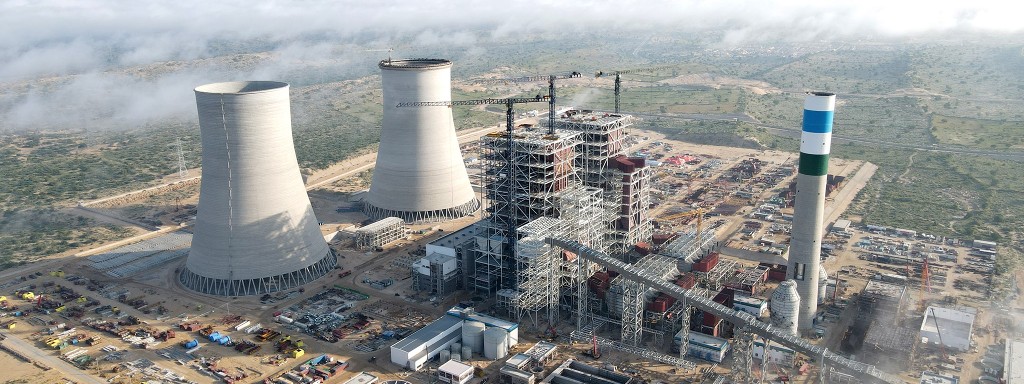The 2×660 MW coalfired Thar Coal Block I power plant is estimated to cut Pakistan’s annual power bill by over a billion dollars, enabling cheaper power to the consumers.
By Muhammad Ali
ISLAMABAD: Electricity consumers struggling under the burden of sky-high tariffs may be in for a reprieve in the coming months as a new 1,320 megawatt coalfired power generation facility is ready to go online as early as December, cutting the nation’s annual power bill by over a billion dollars.
To enable early commissioning of the plant, the Power Division of the Ministry of Energy is seeking cabinet approval for some amendments to the Power Purchase Agreement (PPA), including making it effective from 2019.
This will enable Thar Coal Block-1 Power Generation company (Private) Limited (TCB-I) to achieve financial closure and entitle it to claim COVID-19 force majeure, although the nature and magnitude of that claim is not known.
According to the details available with IP, the Central Power Purchasing Agency (CPPA) conveyed the decision of its Board of Directors to seek approval of ECC of the Cabinet with regards to an amendment to the Power Purchase Agreement (PPA) of 2X660 MW indigenous Coal fired Thar Block-I Project.
During the third meeting of the high-level working group prior to the Prime Minister’s recent visit to China, it was decided that since the project is 90 percent complete, the Power Division should ensure early financial closure.
China’s Shanghai Electric Power company Limited through m/s Thar Coal Block-1 Power Generation Company (Pvt.) Ltd., — or TCB-I – has nearly completed the construction of two power-generation units of 660 MW installed capacity each at Thar in Sindh.
The project is listed as a prioritised project under the CPEC framework signed between Pakistan and China. It is subject to the applicable standard regime in the Power Generation Policy 2015, and all of the rights, incentives, and obligations accruing under the letter of support become effective upon achieving a declaration of financial closure.
The declaration of financial closure acknowledges that the project documentation has been executed and the conditions precedent have been satisfied or waived for allowing the drawdown of the loan to ensure project implementation.
Earlier, the company had conveyed its inability to achieve the financial closure due to unforeseen events and reasons beyond its control which led to delay in Sinosure and lenders’ approvals.
However, in the interest of expediency, TCB-I undertook project implementation with its own equity in March 2019 foregoing the need for financial closure or drawdown of any loan. Currently, the power plant had reached 90 percent completion.
Officials say the unwavering commitment and seriousness of TCB-I is demonstrated through the USD 2 billion invested out of its equity while developing the power project as well as the coalmine. The company has informed officials that it is committed to achieve a commercial operations date (COD) within December 2022.
To start the commissioning process, including testing of the power plant by first week of November 2022, the project requires various authorisations under Power Purchase Agreement. It is not known what other authorisations the company is seeking besides making the PPA effective from 2019.
Under the existing PPA, the required commissioning date of the project was May 31, 2022, and liquidated damages (LDs) to the tune of USD 3 million per month can be imposed by the power purchaser only if the PPA is effective on achieving financial closure by the company. It is not known how the prospective amendments to the PPA will bear on this provision.
However, these LDs cannot be imposed as the company has not achieved the financial closure and the PPA has not become effective. Similarly, the company’s claims for COVID-19 force majeure were also not entertained on the grounds that the PPA is not effective. Owing to PPA not being effective the company cannot claim its COVID-19 force majeure and Power Purchaser cannot impose LDs hence warranting corrective action.
With this background, the Power Purchaser (CPPA-G) deliberated on the matter and sought comments from PPIB and analysis from NTDC/NPCC for feedback.
The NPCC/NTDC shared generation analysis showed that costlier RFO and imported fuel will be replaced by cheap coal-based generation on commissioning of TCB-l. It was estimated that the basket price of power will be reduced by approximately 22 billion (USD 100 million) per month. (Impact assessment based on NTDC/NPCC generation analysis)
Power Division officials say the CPPA will not be able to bring cheap electricity from TCB-1 on tap until the PPA issue is resolved. That would mean the system continuing to generate the same amount of power through the more expensive furnace oil.
The Power Division has moved a summary to be tabled before the ECC to make the PPA effective from date of its execution on July 25, 2019 and authorise CPPA to amend PPA accordingly.
Copyright © 2021 Independent Pakistan | All rights reserved




